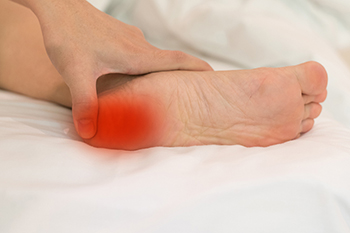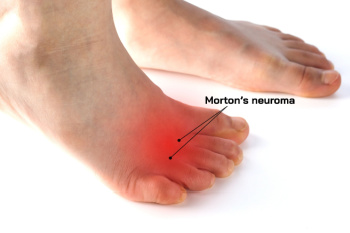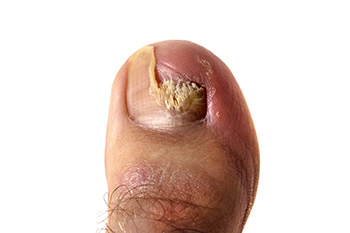
Children and adolescents involved in sports are at risk for overuse foot injuries, which develop gradually from repetitive stress rather than from a single traumatic event. Common examples include Sever’s disease, a painful inflammation of the heel growth plate, and stress fractures that often affect the metatarsals. Tendonitis and plantar fasciitis can also occur in young athletes, especially those involved in high-impact activities like running, soccer, or basketball. These injuries may start as mild soreness but can worsen without rest or proper treatment. Growth plates in developing feet are more vulnerable to strain, making early recognition important. Wearing appropriate footwear, avoiding overtraining, and allowing time for recovery are key prevention strategies. Because lingering foot pain in children is not a normal part of growth, and untreated injuries can lead to long-term problems, it is suggested that you see a podiatrist for evaluation and guidance.
Sports related foot and ankle injuries require proper treatment before players can go back to their regular routines. For more information, contact Leonora Fihman, DPM of California. Our doctor can provide the care you need to keep you pain-free and on your feet.
Sports Related Foot and Ankle Injuries
Foot and ankle injuries are a common occurrence when it comes to athletes of any sport. While many athletes dismiss the initial aches and pains, the truth is that ignoring potential foot and ankle injuries can lead to serious problems. As athletes continue to place pressure and strain the area further, a mild injury can turn into something as serious as a rupture and may lead to a permanent disability. There are many factors that contribute to sports related foot and ankle injuries, which include failure to warm up properly, not providing support or wearing bad footwear. Common injuries and conditions athletes face, including:
- Plantar Fasciitis
- Plantar Fasciosis
- Achilles Tendinitis
- Achilles Tendon Rupture
- Ankle Sprains
Sports related injuries are commonly treated using the RICE method. This includes rest, applying ice to the injured area, compression and elevating the ankle. More serious sprains and injuries may require surgery, which could include arthroscopic and reconstructive surgery. Rehabilitation and therapy may also be required in order to get any recovering athlete to become fully functional again. Any unusual aches and pains an athlete sustains must be evaluated by a licensed, reputable medical professional.
If you have any questions please feel free to contact our offices located in Encino and Brentwood, Los Angeles, CA . We offer the newest diagnostic and treatment technologies for all your foot and ankle needs.

Sever’s disease is a common cause of heel pain in growing children and adolescents. It occurs when the growth plate in the heel becomes inflamed due to repetitive stress and tension from the Achilles tendon. Risk factors include participation in high-impact sports, rapid growth spurts, and footwear that lacks adequate support. Symptoms include heel pain, tenderness, swelling, and discomfort during physical activity. Stretching can help relieve tension and prevent further irritation. Calf stretches improve flexibility and reduce strain on the heel. Heel cord stretches and rolling the foot over a ball can ease tightness in the foot muscles. Additionally, strengthening the lower legs and wearing proper footwear provide additional support. If your active child has heel pain, it is suggested that you schedule an appointment with a podiatrist who can accurately diagnose foot conditions, including Sever’s disease.
Sever's disease often occurs in children and teens. If your child is experiencing foot or ankle pain, see Leonora Fihman, DPM from California. Our doctor can treat your child’s foot and ankle needs.
Sever’s Disease
Sever’s disease is also known as calcaneal apophysitis, which is a medical condition that causes heel pain I none or both feet. The disease is known to affect children between the ages of 8 and 14.
Sever’s disease occurs when part of the child’s heel known as the growth plate (calcaneal epiphysis) is attached to the Achilles tendon. This area can suffer injury when the muscles and tendons of the growing foot do not keep pace with bone growth. Therefore, the constant pain which one experiences at the back of the heel will make the child unable to put any weight on the heel. The child is then forced to walk on their toes.
Symptoms
Acute pain – Pain associated with Sever’s disease is usually felt in the heel when the child engages in physical activity such as walking, jumping and or running.
Highly active – Children who are very active are among the most susceptible in experiencing Sever’s disease, because of the stress and tension placed on their feet.
If you have any questions, please feel free to contact our offices located in Encino and Brentwood, Los Angeles, CA . We offer the newest diagnostic and treatment technologies for all your foot and ankle injuries.

Pain in the ball of the foot, known as metatarsalgia, is a condition that affects many people. It often feels like a sharp, burning, or aching pain in the area between the arch and the toes. Common causes include wearing shoes that lack proper support or cushioning, high-impact activities that place excessive pressure on the forefoot, and foot deformities such as bunions or hammertoes. Other possible reasons for forefoot pain include nerve problems like Morton’s neuroma or thinning of the fat pad that cushions the bones in the ball of the foot. Without proper care, the pain may worsen over time and interfere with daily activities. If you are experiencing persistent pain in the ball of your foot, it is suggested you see a podiatrist for a proper diagnosis and treatment plan that can relieve discomfort and help prevent further complications.
Morton’s neuroma is a very uncomfortable condition to live with. If you think you have Morton’s neuroma, contact Leonora Fihman, DPM of California. Our doctor will attend to all of your foot care needs and answer any of your related questions.
Morton’s Neuroma
Morton's neuroma is a painful foot condition that commonly affects the areas between the second and third or third and fourth toe, although other areas of the foot are also susceptible. Morton’s neuroma is caused by an inflamed nerve in the foot that is being squeezed and aggravated by surrounding bones.
What Increases the Chances of Having Morton’s Neuroma?
- Ill-fitting high heels or shoes that add pressure to the toe or foot
- Jogging, running or any sport that involves constant impact to the foot
- Flat feet, bunions, and any other foot deformities
Morton’s neuroma is a very treatable condition. Orthotics and shoe inserts can often be used to alleviate the pain on the forefront of the feet. In more severe cases, corticosteroids can also be prescribed. In order to figure out the best treatment for your neuroma, it’s recommended to seek the care of a podiatrist who can diagnose your condition and provide different treatment options.
If you have any questions, please feel free to contact our offices located in Encino and Brentwood, Los Angeles, CA . We offer the newest diagnostic and treatment technologies for all your foot care needs.

Onychomycosis is a fungal infection that affects the toenails, causing them to become thick, discolored, brittle, and sometimes painful. It often starts as a small white or yellow spot under the nail and can gradually spread, making the nail more difficult to treat over time. Warm, damp environments, like the inside of shoes, create the perfect conditions for fungi to thrive. Treatment for onychomycosis depends on how severe the infection is. Topical antifungal medications may work for mild cases, while more advanced infections often require oral antifungal medication or special procedures to effectively clear the fungus. In some cases, a podiatrist may need to remove part of the nail to treat the infection underneath. Early diagnosis and intervention improve the chances of successful treatment and prevent the infection from spreading to other nails. If you notice changes in your toenails, it is suggested that you schedule an appointment with a podiatrist for a proper diagnosis and personalized treatment plan.
If left untreated, toenail fungus may spread to other toenails, skin, or even fingernails. If you suspect you have toenail fungus it is important to seek treatment right away. For more information about treatment, contact Leonora Fihman, DPM of California. Our doctor can provide the care you need to keep you pain-free and on your feet.
Symptoms
- Warped or oddly shaped nails
- Yellowish nails
- Loose/separated nail
- Buildup of bits and pieces of nail fragments under the nail
- Brittle, broken, thickened nail
Treatment
If self-care strategies and over-the-counter medications does not help your fungus, your podiatrist may give you a prescription drug instead. Even if you find relief from your toenail fungus symptoms, you may experience a repeat infection in the future.
Prevention
In order to prevent getting toenail fungus in the future, you should always make sure to wash your feet with soap and water. After washing, it is important to dry your feet thoroughly especially in between the toes. When trimming your toenails, be sure to trim straight across instead of in a rounded shape. It is crucial not to cover up discolored nails with nail polish because that will prevent your nail from being able to “breathe”.
In some cases, surgical procedure may be needed to remove the toenail fungus. Consult with your podiatrist about the best treatment options for your case of toenail fungus.
If you have any questions, please feel free to contact our offices located in Encino and Brentwood, Los Angeles, CA . We offer the newest diagnostic and treatment technologies for all your foot care needs.
